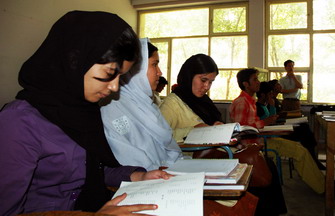Searching for Chinese roots in Africa
Before coming to Africa, Xie studied and worked at Zhe-jiang Normal University for more than 10 years. In October 2012, she was deputed by the school to start and teach at the Confucius Institute at Eduardo Mondlane University in Maputo.
Before the Mozambique institute was established, there were already institutes and classrooms in such countries as Cameron, Tanzania and Madagascar. Unlike such countries as Nigeria and Ethiopia, there were very few Chinese in Mozambique as a result of the civil war, which ended in 1992. So Xie assumed there would be few people interested in learning Chinese.
But the results have been quite different, she says with a smile.
"When the first term started, we had more than 270 people registered for the classes. Most of the students were local workers from Chinese companies who wanted to improve their language skills so they could get higher-paid posts, and overseas Chinese who were in Africa for most of their lives," Xie says.
Though culture and better job prospects are the prime motivators, affordability and China's growing engagements in Africa have also sparked interest in language classes.
"The tuition fee in most cases is just symbolic - 500 to 1,000 meticais (about $19 to $38) for the three-month term - and barely enough to cover the textbook and printing costs. The China National Office for Teaching Chinese as a Foreign Language, or the Hanban, pays our salaries," Xie says.
The first classroom was on the first floor of an old Portuguese-style building, owned by the Chinese community in Maputo, she says. On the ground floor of the building was a club teaching kung fu. It was not uncommon for the shouts of the kung fu students to mingle with the noise of the students in the Chinese-language classroom.
"We were apprehensive in the initial days that we would not be able to attract enough students," Xie says.
"We had even contemplated taking out huge advertisements in local newspapers and putting up posters to attract students on a continuous basis. Our worries were unfounded, as we found that students were flocking to the classes more on referrals and on being told about it by friends, neighbors and well-wishers."
Once the school was well known, Xie and her team decided to set up a second campus in a local university. They recently opened a class for 80 soldiers from the local army and another class for 20 immigration officers at Maputo International Airport, who, from time to time, encounter Chinese people who don't speak Portuguese.
The institute has four teachers and eight volunteers, all from Zhejiang Normal University. Before joining the Hanban, the team had to learn Portuguese for at least a year and be vetted, which included completing a psychological test, to ensure they could adapt to their new surroundings.
 |
|
| Confucius Institute reopens in Kabul |























